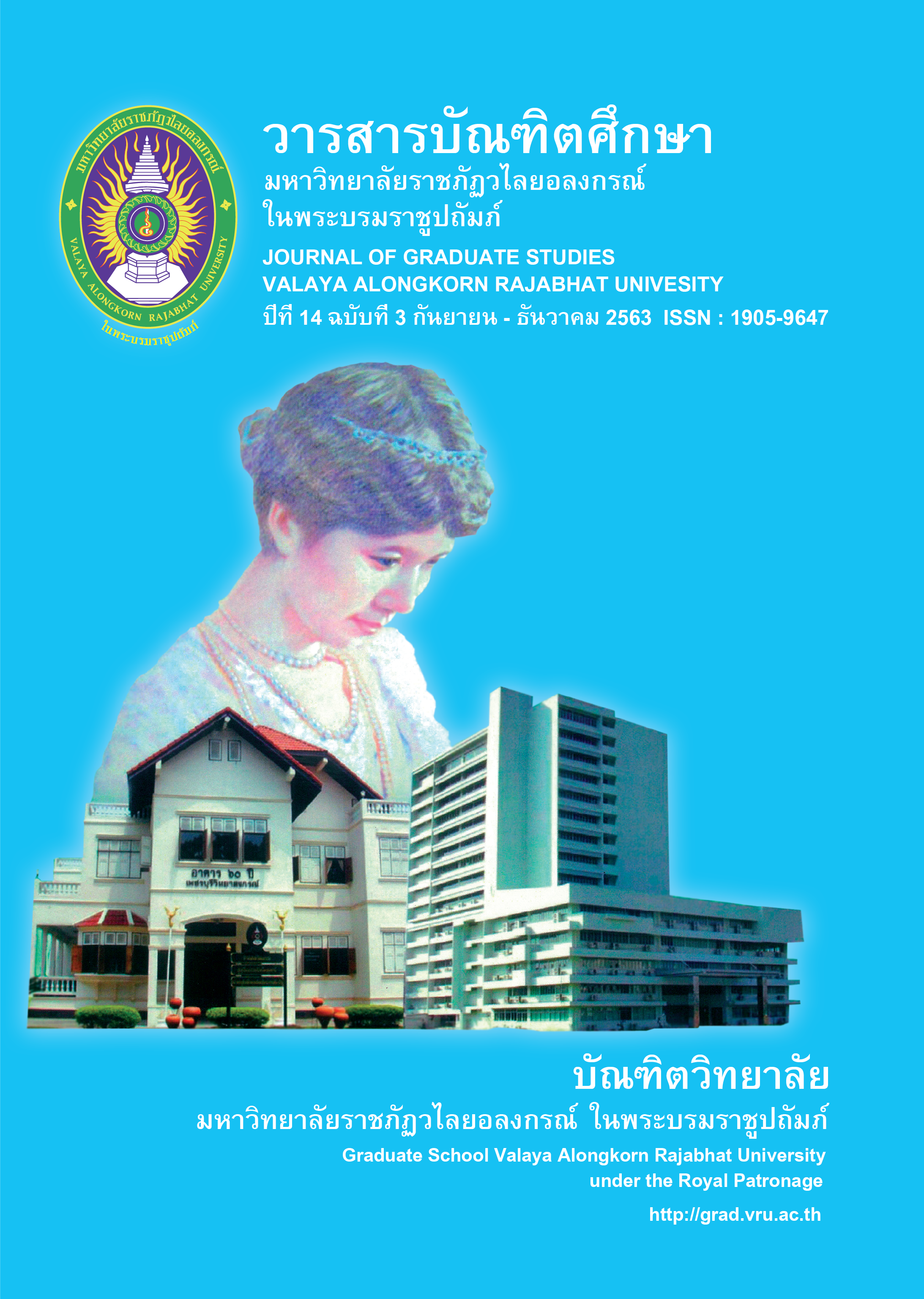EFFECTS OF STEM EDUCATION APPROACH ON CHEMISTRY ACHIEVEMENT, PROBLEM SOLVING ABILITY OF GRADE 10 STUDENTS
Main Article Content
Abstract
The objectives of this research were 1) to compare academic achievement in chemistry before and after taught with STEM education and 2) to compare problem solving ability of students before and after taught with STEM education. The sample of this study was 44 Mathayom Suksa 4/1 students in the first semester of the academic year 2019 at The Demonstration School of Valaya Alongkorn Rajabhat University Under the Royal Patronage. A duration of implementing SETM education was 12 hours. The research instruments were STEM education-based learning plan with inquisitive learning on Compound Separation, academic achievement test, problem-solving ability test, field note and interview. This study used one-group pretest - posttest design. Data were analyzed by determining mean, standard deviation, and Independent Sample
T-Test.
The results of this research: 1) after taught with STEM education, the sample’s posttest score was higher than pretest score with a statistical significance level of .01. And 2) after taught with STEM education, the sample’s academic achievement in chemistry and problem-solving ability was higher than before with a statistical significance level of .01.
Article Details

This work is licensed under a Creative Commons Attribution-NonCommercial-NoDerivatives 4.0 International License.
บทความทุกเรื่องได้รับการตรวจความถูกต้องทางวิชาการโดยผู้ทรงคุณวุฒิ ทรรศนะและข้อคิดเห็นในบทความ Journal of Global of Perspectives in Humanities and Social Sciences (J-GPHSS) มิใช่เป็นทรรศนะและความคิดของผู้จัดทำจึงมิใช่ความรับผิดชอบของบัณฑิตวิทยาลัย มหาวิทยาลัยราชภัฏวไลยอลงกรณ์ ในพระบรมราชูปถัมภ์ กองบรรณาธิการไม่สงวนสิทธิ์การคัดลอก แต่ให้อ้างอิงแหล่งที่มา
References
Klaynil, S., Dejsri, P. & Pramojnee, A. (2008). khwāmrū læ samatthana thāng witthayāsāt samrap lōk wan phrungnī : rāingān čhāk kānpramœ̄nphon nakrīan nānā chāt PISA sō̜ngphanhok [Science Knowledge and Competency for the World Tomorrow: PISA International Student Assessment Report]. Bangkok: The Institute for the Promotion of Teaching and Technology.
Rugbida, A. (2006). phon khō̜ng kānčhatkān rīanrū tām nǣokhit witthayāsāt theknōlōyī læ sangkhom tō̜ phon samrit thāngkān rīan khwāmsāmāt nai kān khit kǣ panhā læ khwāmphưngphō̜čhai khō̜ng nakrīan chan matthayommasưksā pī thī hā [Effects of the Science, Technology and Society Approach on Achievement and Problem Solving Ability and Satisfaction of Mathayomsuksa Five Students]. Master’s thesis of Education in Science Education, Prince of Songkla University.
Rungluxsameesri, W. (2008). phon khō̜ng kān rīan kānsō̜n thī nēn krabūankān ʻō̜k bǣp thāng witsawakam thī mī tō̜ khwāmsāmāt nai kān kǣ panhā chœ̄ng witthayāsāt læ thaksa krabūankān thāng witthayāsāt khan phasomphasān khō̜ng nakrīan chan matthayommasưksā tō̜n ton nai rōngrīan sāthit [Effects of instruction emphasizing engineering design process on scientific problem solving ability and integrated science process skills of lower secondary school students in demonstration schools]. Master’s thesis of Science, Chulalongkorn University.
Saengpromsri, P. (2015). kānprīapthīap phon samrit thāngkān rīan thaksa krabūankān thāng witthayāsāt khan būranākān læ čhētakhati tō̜ kān rīan wichā khēmī khō̜ng nakrīan chan matthayommasưksā pī thī hā thī dai rap kānčhatkān rīanrū sa tem sưksā kap bǣp pakati [Comparisons of learning achievement, integrated science process skills, and attitude towards chemistry learning for Matthayomsueksa 5 students between STEM education and conventional methods]. Master’s thesis of Science, Mahasarakham University.
Siripatthachai, P. (2013). STEM Education kap kānphatthanā thaksa nai satawat thī 21 [STEM Education and 21st Century Skills Development]. Journal of executive. 2(2), 49-56.
Tanoorut, T. (2010). kānsưksā khwāmsāmāt nai kān kǣ panhā læ phon samrit thāngkān rīan klum sāra kān rīanrū witthayāsāt rư̄ang sombat khō̜ng watsadu khō̜ng nakrīan chan prathomsưksā pī thī hā thī dai rap kānsō̜n bǣp wattačhak kān sư̄pso̜ hākhwām rū [The Study of Problem Solving Ability and Learning Achievement in Science Learning Substance titled “Material Characteristic,”of Pratomsuksa 5 Students Taugh by Inquiry Cycle.]. Master’s thesis of Education, Khon Kaen University.
The Institute for the Promotion of Teaching and Technology. (2003). kānčhat sāra kān rīanrū klum witthayāsāt laksūt kānsưksā naphư̄n thān [Organizing learning topics in science, basic education curriculum]. Bangkok: The Institute for the Promotion of Teaching and Technology.
Weir, J. (1974). Problem Solving is every body’s Problem. The Science Teacher. 4 (April 1974), 16–18.


